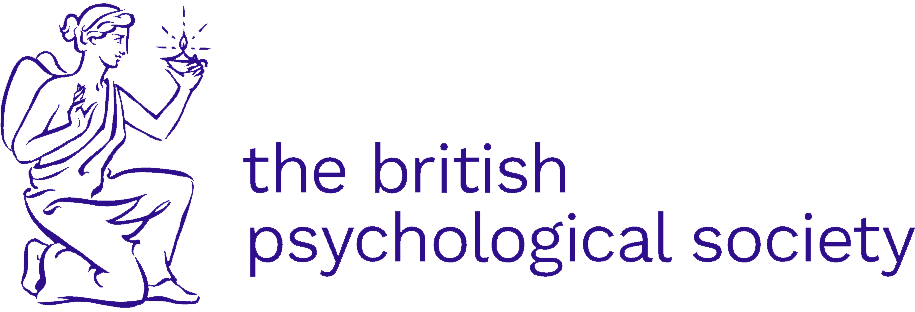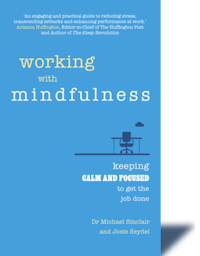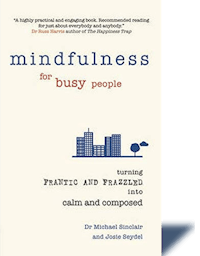Psychiatrist, Psychologist, Psychotherapist, or Counsellor: What's the Difference? (Plus, What Does a Counselling Psychologist Do?)
This question is one that I am often asked - so often, in fact, that I thought I would write a short blog about these different roles, and their application and meanings in the treatment of mental illness and distress.
For those who wish to get an ‘in a nutshell’ overview there is a table at the end of this article outlining the broad differences between each profession and approximate costs per hour (UK, 2023).
Please note that the views within this article are entirely my own, unless otherwise referenced, and I take full responsibility for any inaccuracies that may be found in this article despite my best endeavours. I would also like to acknowledge the skilled and dedicated practitioners across all mental health professions (including many not referred to in this article) and their commitment to enhancing the well-being of others.
A Short Preface:
Symptoms and conditions considered to constitute a ‘mental illness,’ ‘psychological distress’ or ‘psychiatric diagnosis,’ a ‘disorder’ or ‘abnormal,’ are under considerable and constant debate, as is the very language used to describe and diagnose patients. Nevertheless, mental illness has historically been synonymous with something abnormal, to be feared and expelled from the body and mind whether spiritually, pharmaceutically, or even surgically. Those identified as mentally ill have also frequently been exposed to terrible oppression, incarceration, cruelty, experimental and unethical treatments, social exclusion, and derision. In this article whilst I use some of these terms interchangeably, I really feel that, whether an individual is engaged with this terminology and identity or not, it is imperative to create more helpful narratives around psychological struggle. We also need to acknowledge the impact of culture, politics, environment, and social and family systems upon the individual rather than seeing the individual as blameworthy, weak, abnormal, or defective in some way.
Thankfully today, despite persistent and enduring prejudice towards the mentally ill, it is more widely accepted that mental illnesses and distress are an inevitable part of the human experience. In fact, mental distress is very common, and often an appropriate, if unwanted and confusing, response to the consequences of our stressful lives, environment, and history. Often the expression of our distress is an attempt to self-regulate when we are overwhelmed by life- as Gabor Maté writes:
“Surprising but true: the very mental patterns and behaviours that seem to throw our lives into such chaos originate as an attempt, a temporary and partially effective one, to regulate our nervous systems, to bring our bodies and minds into equilibrium”
Gabor Maté, 20221
All therapists (such as psychiatrists, psychotherapists, psychologists, or counsellors) of any value or repute, are concerned with providing quality of care to their patients. Practitioners of all models should seek to assist you to self-regulate and find balance in the chaos. You should find that they take great care to be open-minded, non-judgemental, and respectful towards you at all times.
As a simple checklist for any mental health professional, you may want to make sure that they:
- Are respectful, non-judgemental, compassionate, empathic, and open-minded
- Listen
- Help you to feel empowered
- Foster a relationship with you that feels safe and trusting
- Maintain healthy professional boundaries
- Offer evidence-based practices and treatments
- Undertake self-reflexive practices (such as regular supervision)
- Are committed to continuing professional development
- Abide by and are accountable to a clear code of ethics
- Practice what they preach (e.g.: they would, or do, personally take the medications, interventions, and treatments that they offer you, under similar circumstances)
More specifically let us now take a closer look at psychiatrists, psychologists, psychotherapists, and counsellors in turn, and consider the unique and shared aspects of each profession.
1 Maté, Daniel, 2022, The Myth of Normal: trauma, illness, and healing in a toxic culture, p259, New York: Avery, an imprint of Penguin Random House, [2022].
What is a psychiatrist?
A psychiatrist is a medically trained doctor who then specialises mental health. This means that a psychiatrist will have undertaken about 5 years of study to obtain a medical degree (in the UK), followed by a further two years of 'foundation' level jobs, before specialising in psychiatry. To become a fully trained psychiatrist typically takes another four years of dedicated study.
Ultimately psychiatrists specialise in one of six areas: child and adolescent psychiatry, forensic psychiatry, general adult psychiatry, medical psychotherapy, old age psychiatry and psychiatry of learning disabilities. The job title of ‘psychiatrist’ is a protected title, meaning that (in the UK) only practitioners registered with the ‘Royal College of Psychiatrists’ can legally use this title.
Psychiatrists are highly skilled in medical diagnosis and the prescription of psychiatric medication (sometimes referred to as behavioural medicine or psychopharmacology), and may well also be involved in teaching and research, as well as consultancy and policy-making. They tend to work with those with more severe conditions or those that require specialist medical attention. For instance, physical monitoring (i.e., blood tests and CAT scans) is essential in the treatment of severe eating disorders, or for neuropsychological disorders (such as Alzheimer’s), as well as alongside many psychiatric medications, which may have strong side-effects.
“As we continue to learn about the science of mental health, the brain and about the importance of good mental health, psychiatry is being recognised as being an important branch of medicine2”
Royal College of Psychiatrists’ website, 2023
Usually, an individual is referred to a psychiatrist by their medical doctor, however, it is also possible to see a psychiatrist privately. Many psychiatrists working in the NHS may have very little time with each patient and it is therefore unusual for them to also provide psychological interventions or ‘talking therapy,’ however, some have additional training in certain psychotherapies and may offer this personally, especially if they are a private clinician. More typically however, psychiatrists refer onwards to psychologists or other health professionals for psychotherapy.
2 https://www.rcpsych.ac.uk/become-a-psychiatrist/choose-psychiatry/why-choose-psychiatry
What is a psychologist?
Psychology is a broad and diverse science; psychologists study human (and animal) development, cognition, emotion, personality, behaviour and much more. To become a Chartered Psychologist takes a minimum of 6 years of study.
Psychologists may be involved with academic research studies, work in laboratories, inform policy making, provide training and consultation, psychological assessments and testing and provide psychological interventions and psychotherapy.
“The title of Chartered Psychologist is legally recognised and reflects only the highest standard of psychological knowledge and expertise”
British Psychological Society website 2023 [3]
The Health Care and Professionals Council (HCPC) is the recognised regulatory body for psychologists in the UK, and protects the following titles: practitioner psychologist, registered psychologist, clinical psychologist, counselling psychologist, educational psychologist, forensic psychologist, health psychologist, occupational psychologist and sport and exercise psychologist. It is illegal to use any of these titles unless registered with the HCPC.
Clinical and counselling psychologists are both quite similar in many ways and both may provide psychotherapy and may also identify as psychotherapists. Both clinical and counselling psychologists can work with severe and complex mental health difficulties, are adept at providing in-depth assessments, diagnostic testing, case formulations, treatment plans, and at writing psychological reports. Clinical psychologists’ emphasis is generally more focused on diagnosing psychopathologies and disorders and using diagnostic testing, in line with a medical model of treatment; whereas a counselling psychologist is specialised in working with an individual’s unique subjective psychological experience to empower their recovery and alleviate distress, requiring competency in at least 2 therapeutic models.
Often an individual is referred to a psychologist through their GP or psychiatrist, it is also common to self-refer for private treatment. To see a psychologist with the NHS may involve waiting for quite some time, commonly 3 months or (much!) longer, appointment times may be reduced to 45 minutes and are usually for a limited number of psychotherapy sessions, typically 8-12.
“More than one in ten (12%) people with mental health problems are stuck on waiting lists for over a year before receiving talking treatments and over half (54%) wait over three months4”
Mind (mental health charity) website, 2023
3 https://www.bps.org.uk/chartered-membership-cpsychol
4 https://www.mind.org.uk/news-campaigns/news/people-with-mental-health-problems-still-waiting-over-a-year-for-talking-treatments/
What is a psychotherapist?
‘Psychotherapy’ is a broad title referring to talking therapies and the associated approaches, modalities, and methods. Confusingly, clinical and counselling psychologists both practice psychotherapy, as can therapists and counsellors with less education and clinical training.
Psychotherapists usually have expertise in one therapeutic modality (although some may have more) which could include, cognitive and behavioural therapy, psychoanalytic psychotherapies, humanistic or person-centred therapies and/or music, art, and drama therapy. To train as a registered psychotherapist does not require a degree, although there are degree programmes in psychotherapy in the UK which take a minimum of three years.
Psychotherapy training is varied in quality and standard and there are currently no legal restrictions in the UK surrounding the title of psychotherapist. This means that anyone can call themselves a psychotherapist, regardless of training or experience, so it is vital that if you chose to see a psychotherapist you check their credentials, training, and experience to ensure safety and quality of service. However, the title ‘registered psychotherapist’ is protected by the UKCP (United Kingdom Council for Psychotherapy) ensuring high standards of training and professionalism of those listed on the register. Many psychotherapists are also registered with other professional associations (such as the BACP (British Association for Counselling and Psychotherapy), NCPS (National Counselling and Psychotherapy Society) or BABCP (British Association of Behavioural and Cognitive Psychotherapists)) which promote safe, ethical, and competent practice in counselling and psychotherapy.
Registered psychotherapists use evidence-based practices to help people overcome emotional, behavioural, and psychological difficulties such as anxiety, depression, and relationship issues. They generally work with mild to moderate issues whilst more severe conditions, such as psychosis, will typically be referred to psychologists or psychiatrists.
What is a counsellor?
A professionally trained counsellor may provide services very similar to those of a psychotherapist, but, as a rule, they tend to treat the less severe end of mental health issues and have a less rigorous training.
Good quality training as a counsellor involves a combination of theoretical study and practical experience. According to the British Association for Counselling and Psychotherapy training as a counsellor should take a minimum of one year:
“It should also include an integral, supervised placement of at least 100 hours, allowing you to work within an organisation and practise your skills with clients under supervision.” 5
The importance of the therapeutic relationship and the qualities of therapist, being core components of any therapeutic relationship, form the central focus of most counselling training.
A degree is not required for someone to become a counsellor, nor is there any regulation over who can use the title. However, counsellors may be registered with organisational bodies such as The UKCP (United Kingdom Council for Psychotherapy) BACP (British Association for Counselling and Psychotherapy) or NCPS (National Counselling and Psychotherapy Society) which offer professional support to their members, and this is a good indication that they are well trained.
NHS funded counselling sessions are often accessed by a referral from a GP and may be held with a counselling service within a surgery or practice, or with specialist services, charities, or helplines. Counselling services, such as helplines, may be free, but these sessions tend to be ad hoc rather than formal, regular appointments. Telephone, online or in-person sessions are usually limited in number to about 10 sessions. Seeing a counsellor privately, is often a very cost-effective way of getting support for less severe issues, and many counsellors are highly trained and skilled. Unfortunately, the quality of counsellors can vary greatly and checking a professional’s experience, training and qualifications is always advised.
5 https://www.bacp.co.uk/careers/careers-in-counselling/training/
Psychological Therapy
I am grateful you are here and thinking about not having to struggle on alone.
What exactly is a counselling psychologist?
Counselling psychologists are a relatively new group of applied psychologists (achieving full professional status in 1994). They offer clinical treatment and interventions informed by psychological research and scientific theory. In addition, a counselling psychologist must demonstrate high levels of self-awareness, competence in clinical skills, knowledge of complex inter-personal dynamics and be proficient in understanding and conducting research.
Counselling psychologists understand diagnosis and the medical context to mental health problems, but they work from an individual’s unique subjective experience to empower them in their recovery from psychological distress. Unlike psychiatrists, psychologists are not medically trained, so they do not prescribe medications.
To become a counselling psychologist requires a degree in psychology (2.1 or above), followed by doctoral level study in Counselling Psychology leading to registration with the HCPC (Health and Care Professionals Council). Training takes a minimum of 6 years, but often students will also need to complete counselling training before being accepted onto a doctoral programme. Students undertake many hours of supervised clinical practice, personal therapy and must produce a research dissertation as well as having academic training in areas such as neuropsychology, psychometric testing, and developmental psychology. The HCPC requires counselling psychologists to receive in-depth training in one therapeutic model and have a working knowledge of at least one other, as a minimum. This means that counselling psychologists can tailor their approach to work with clients in a way that meets individual needs.
Although there is some overlap, counselling psychologists differ from counsellors and psychotherapists in these main ways:
- Counselling psychologists are required to have a degree in psychology
- To become a counselling psychologist requires completion of a doctorate (or equivalent), meaning training is both academic and professional.
- Counselling psychologists are trained to understand medical diagnosis, to use diagnostic testing (such as psychometrics), to understand academic research and to produce psychological formulations and reports.
- Counselling psychologists are trained in more than one method of psychotherapy, meaning they appreciate and can deliver a diversity of approaches.
- ‘Counselling Psychologist’ is a legally protected title. Only person’s meeting the strict criteria can register - providing assurance to the public that someone using that title is competent and safe to practise.
| Job* | Key Features | Approx. cost per hr (UK, 2024) |
|---|---|---|
| Psychiatrist (MRCPsych or FRCPsych) | Medical training | £225 - £510 |
| Diagnosis | ||
| Prescribing | ||
| Research | ||
| Teaching | ||
| Sometimes psychotherapy | ||
| Tends to treat severe mental illness | ||
| Psychologist (C.Psychol) | Diagnosis | £110 - £200 |
| Should be HCPC registered | Psychometrics and testing | |
| Psychotherapy | ||
| Research | ||
| Teaching | ||
| Treats all levels of severity of mental illness | ||
| Psychotherapist | Psychotherapy | £60 -£100 |
| Not a protected title | Sometimes research | |
| Preferably registered with UKCP/ BABCP/ BACP | Sometimes teaching | |
| Typically treats less severe mental illness | ||
| Counsellor | Varied level and quality of training in counselling skills | £40 -£70 |
| Not a protected title | Typically treats milder end of mental illness and distress | |
| Preferably registered with UKCP/ BABCP/ BACP/ NCPS | ||
*It is strongly recommended to ONLY employ the services of persons registered with one or more of the regulatory organisations listed here (UK) or to check an individual therapists’ qualifications thoroughly.










